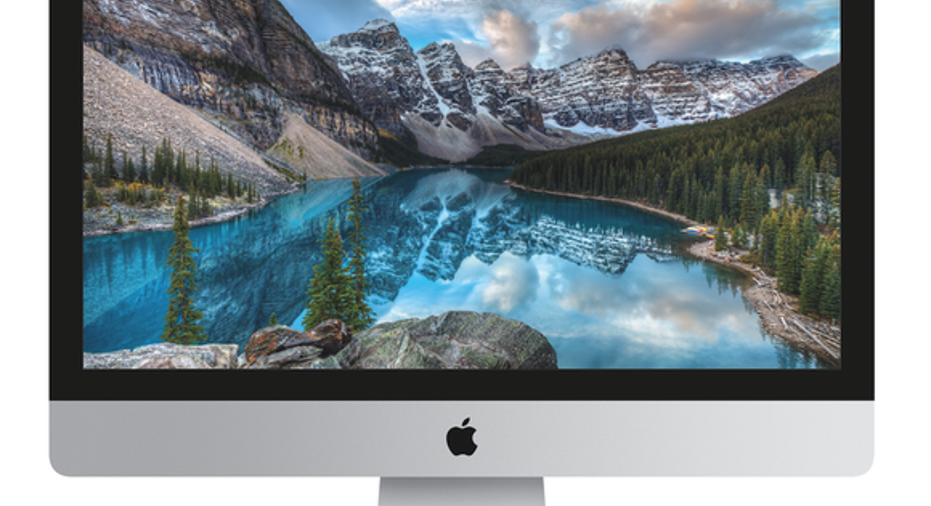When Will Apple, Inc. Complete Its Retina Transition?

iMac with 5K Retina display. Image source: Apple.
It's now been six years since Apple (NASDAQ: AAPL) embarked upon its journey toward high-resolution Retina displays. It all started with the iPhone 4 in 2010, which was the first Apple product that featured a display so sharp that you couldn't discern individual pixels from normal viewing distances. As soon as Apple signaled its intent to pursue Retina displays, it was only a matter of time before the company would inevitably bring that feature to the rest of its lineup.
It's still an ongoing transition, but Apple may complete it soon enough.
A trip down memory lane
Shortly after the iPhone 4, Apple expectedly brought Retina displays to the iPad family, starting with the third-generation iPad in 2012. That was the same year that Apple launched the 15-inch MacBook Pro with Retina display. The first Retina iMac came in 2014 with a 27-inch 5K display. Apple Watch is considered Retina as well.
The Mac transition was a little trickier to navigate in terms of adoption, though. The larger displays translated into higher costs, which led to higher prices and it took more work to sell consumers on the premium associated with high-resolution displays. In contrast, there was no Retina-related price premium for iPhones or iPads. Apple just started shipping them at the same price point, which made adoption a no-brainer from a consumer perspective.
In the years since, Apple has made progress with getting consumers to adopt Retina displays, in part because the costs (and the related premium) have come down. It should be obvious that Apple's overall goal will be to eliminate lower-resolution displays eventually and only sell Retina models. In that sense, the transition will be complete once Apple discontinues any remaining non-Retina products. That leaves just 4 products to go: the 11-inch MacBook Air, the 13-inch MacBook Air, the 13-inch MacBook Pro, and the entry-level 21.5-inch iMac (the one without a Retina 4K display).
RIP 13-inch Pro?
With a Mac-oriented event widely expected later this month, the real question is whether or not Apple will take the opportunity to discontinue any of these four products. The company recently discontinued its Thunderbolt Display, and rumors suggest that Apple may launch a 5K stand-alone display at the event.
There's no sugar-coating this: The 13-inch MacBook Pro should have died a long time ago. It's strange that Apple even still sells the laptop, which was last updated in 2012. It offers such terrible value that it's hard to imagine people still buying this aging laptop, but presumably people still do if Apple still sells it.
The MacBook Air is a different story. The new 12-inch MacBook appears to be the spiritual successor, but since that product was launched just last year and Apple is still likely near the height of its cost curve, the ultra-thin device carries a hefty premium. It's too expensive at this point for the MacBook to supplant the MacBook Air, which serves as an entry-level laptop. Strategically, it doesn't seem that Apple could discontinue the MacBook Air quite yet in favor of the MacBook, but the writing is on the wall. In a generation or two, the 12-inch MacBook's cost structure may come down enough to replace the MacBook Air.
The same is likely true for the 21.5-inch iMac, although this will probably happen sooner. Thanks to the shared overall design, the added cost should primarily be associated with components, as opposed to entirely different manufacturing infrastructure necessary for different designs.
My guess is that Apple discontinues one of the four remaining non-Retina products this month: the 13-inch Pro. The Air and iMac should follow shortly thereafter once costs permit competitive pricing, so maybe we'll see another one bite the dust next year.
A secret billion-dollar stock opportunity The world's biggest tech company forgot to show you something, but a few Wall Street analysts and the Fool didn't miss a beat: There's a small company that's powering their brand-new gadgets and the coming revolution in technology. And we think its stock price has nearly unlimited room to run for early in-the-know investors! To be one of them, just click here.
Evan Niu, CFA owns shares of Apple. The Motley Fool owns shares of and recommends Apple. The Motley Fool has the following options: long January 2018 $90 calls on Apple and short January 2018 $95 calls on Apple. Try any of our Foolish newsletter services free for 30 days. We Fools may not all hold the same opinions, but we all believe that considering a diverse range of insights makes us better investors. The Motley Fool has a disclosure policy.